Text Copyright 2011 by Janice Spaulding All rights reserved. Goat School is a registered trademark owned by Ken and Janice Spaulding, Stony Knolls Farm, Saint Albans, Maine. ISBN: 978-0-89272-956-2 Library of Congress Cataloging-in-Publication Data Spaulding, Janice. Goat School : a master class in caprine care and cooking / by Janice Spaulding. p. cm.
Includes index. ISBN 978-0-89272-956-2 1. Goats. 2. Agriculture--Maine. 3.
Farms--Maine. 4. Goat farmers--Maine. 5. Goat milk. 6.
Goat cheese. 7. Goat meat. 8. Cooking, American. Title. Title.
SF383.S68 2011 636.3'9--dc23 2011020866 Illustrations by Patrick Corrigan Design by Chad Hughes Cover design by Miroslaw Jurek and Ari Meil Printed in the U.S.A. 54321  Books Magazine Online www.downeast.com Distributed to the trade by National Book Network
Books Magazine Online www.downeast.com Distributed to the trade by National Book Network 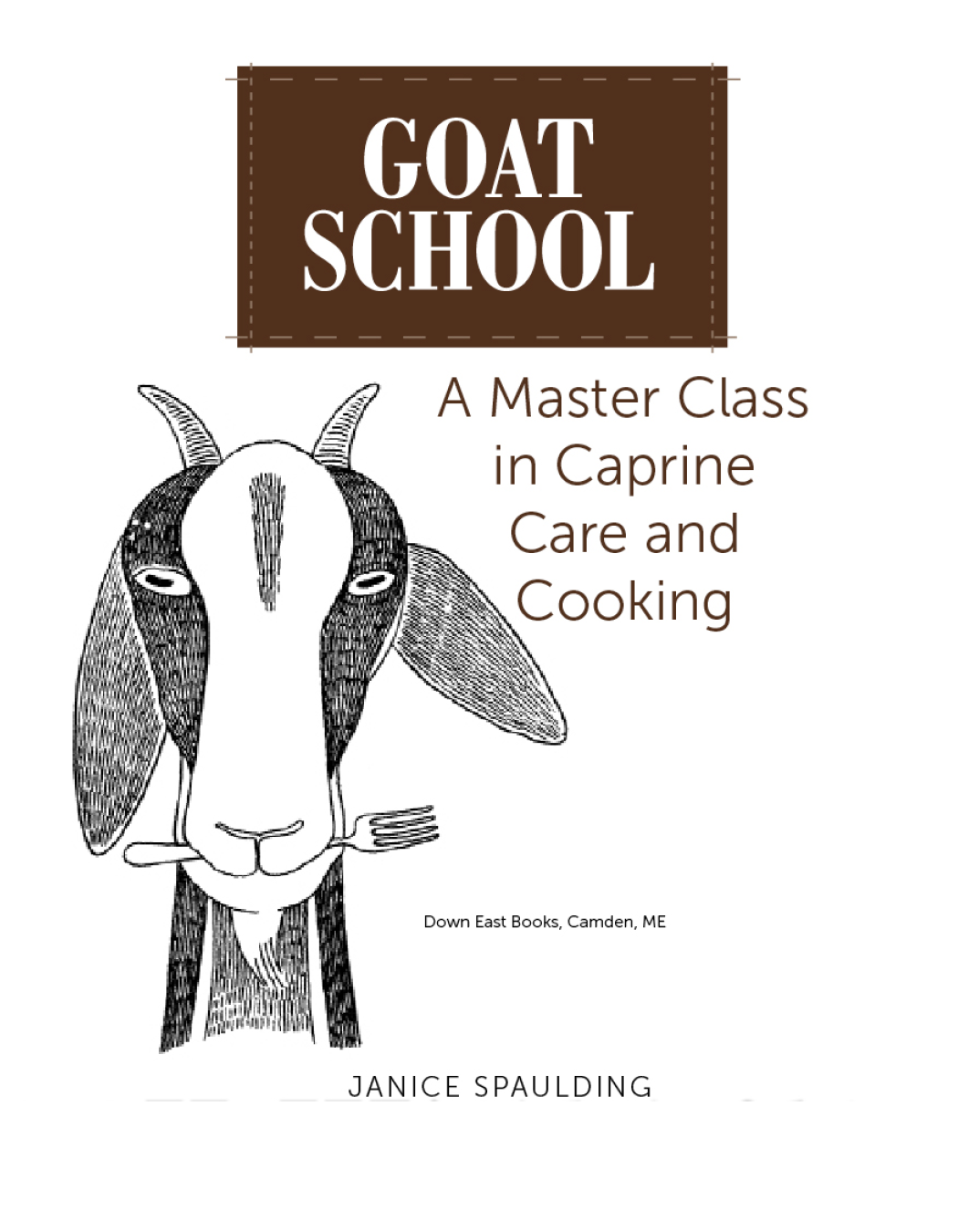 To Martha, my sister and friend! Thank you for prodding, joking, and teasing me into doing this book in my spare time. Thank you for crying with me when I lost my dog, for laughing with me at the antics of our goats, and just for being there. You are a true best friend! Introduction We started our goat-raising adventure before the invention of the Internet and well before cell phones, back in the days of long-distance telephone charges and monthly periodicals with breeder lists. Imagine trying to do that today! Our first goats were located in Lebanon, New Hampshire. Two angoras gave us our start.
To Martha, my sister and friend! Thank you for prodding, joking, and teasing me into doing this book in my spare time. Thank you for crying with me when I lost my dog, for laughing with me at the antics of our goats, and just for being there. You are a true best friend! Introduction We started our goat-raising adventure before the invention of the Internet and well before cell phones, back in the days of long-distance telephone charges and monthly periodicals with breeder lists. Imagine trying to do that today! Our first goats were located in Lebanon, New Hampshire. Two angoras gave us our start.
One was a doeling and the other a bred doe. We very quickly became hooked. Just like potato chips you cant have just one. It didnt take long to have a herd of forty pampered, mohair-producing goats. We enjoyed our angoras because we could have the love of our goats and produce a non-destructive product (the mohair). In 2000, we began to put together a wonderful herd of Boer goats.
Even though Boers are a meat goat, our plan was to raise top-quality breeding stock (which we did) so that others could be assured of utilizing locally grown animals for their breeding programs. Maine has a very cold climate, so hearty, locally grown stock is important to ensure a thriving goat population. As the demand for good-quality Boer goats waned, we recognized a pattern from the past and had already purchased some dairy goats. We now enjoy the fruits of their labor, fresh milk and cheese. This also brings us back to our original goal of raising animals, to harvest a product, in a nondestructive way. From the very first days of our goat-raising experience we were struck by the lack of information available to beginning breeders.
It was apparent that no one wanted to share much information. It became a trial-and-error experience. This has gone on even to the present time. The remark most often heard by us from our students always has to do with their surprise in our willingness to share information. Maybe it comes from our own frustration in having to learn the hard way. This to us was always unacceptable.
Goats are wonderful, loving, giving creatures and deserve the absolute best care that we can provide. The financial bottom line has never been the focus at Stony Knolls Farm. Our bottom line was, is, and will continue to be the health and well-being of the goats. It is from that place that we developed Goat School, where students can come to Saint Albans to learn everything we can teach them in one weekend about goat ownership. It has been so successful that we decided to publish this book as a primer for anyone thinking about getting goats. The following pages are a combination of our original manual for our Goat School students and a compilation of a hundred of my ever-popular Goat School buffet recipes, plus some of the recipes used to produce what we sell at farmers markets all summer long.
We hope this book will be the first stop in the wonderful journey that is living with goats. -Janice 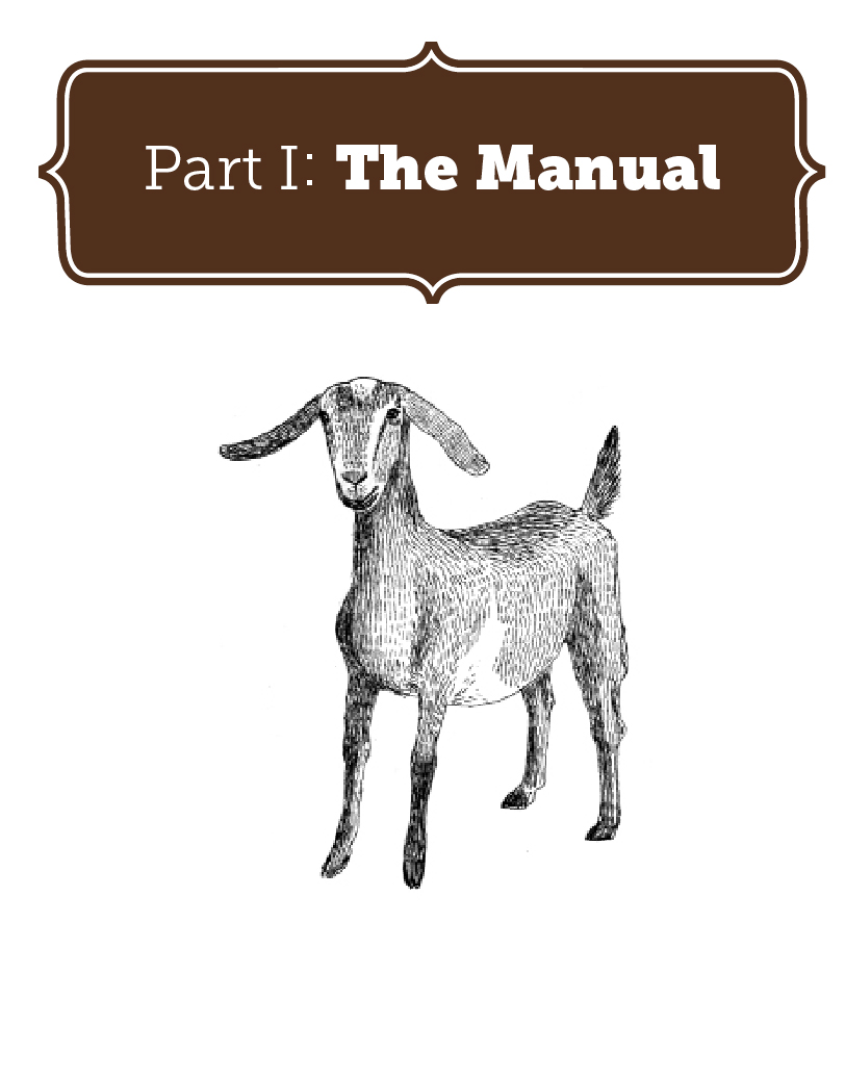 Why Raise Goats?
Why Raise Goats?  Getting the Goat Bug Goats are amazing creatures. They are smart, funny, personable, nosy, and did I say smart? They can open any latch, sometimes unlock doors, turn light switches on and off, take things apart, and they love to help! Yes, help. They will help you shovel snow or poop, they will help you put back together what they so nicely took apart, they will untie your shoe laces for you, they love helping take things out of your pockets, they love to help you change that light bulb when you are up on a ladder, but most of all they will help you fall in love with them. And, of course, there are all the good products that they produce (with a little help from you): fiber, meat, dairy, brush clearing, packing; they are also used in the medical research fields. Goats are used to obtain certain serums used in medications (no they do not kill them to do that).
Getting the Goat Bug Goats are amazing creatures. They are smart, funny, personable, nosy, and did I say smart? They can open any latch, sometimes unlock doors, turn light switches on and off, take things apart, and they love to help! Yes, help. They will help you shovel snow or poop, they will help you put back together what they so nicely took apart, they will untie your shoe laces for you, they love helping take things out of your pockets, they love to help you change that light bulb when you are up on a ladder, but most of all they will help you fall in love with them. And, of course, there are all the good products that they produce (with a little help from you): fiber, meat, dairy, brush clearing, packing; they are also used in the medical research fields. Goats are used to obtain certain serums used in medications (no they do not kill them to do that).
Heart medications and pregnancy tests both use blood obtained from goats. Bet you thought that pregnancy tests still used rabbits! Wrong. But, before you fall totally in love with goats, please be sure you are ready for the commitment. Answer these few questions and find out if you are truly ready for the big step of goat ownership. Are Goats for Me? A goat is a big commitment. Before you take the plunge, here are nine important questions to ask yourself.
If you dont answer yes to most of these, perhaps you should reconsider, and stick with household pets like gerbils or goldfish. Can I make myself available twice each day to feed, water, hay, and spend quality time with my goats? What is my schedule like? Will that twice-a-day time period fall at the same time each and every day, such as 7 a.m. and 7 p.m.? Do I have adequate shelter for these animals? Do I have a fenced area that is large enough for the animals to get exercise, and strong enough to keep not only them in, but predators out? Is it tall enough to keep high-jumping goats in? The old saying goes, If your fence will hold water, it will keep in a goat. Can I provide adequate health care for them, either by myself or from a local
veterinarian who deals with large animals? (Most dog and cat vets will NOT take care of goats for you!) Can I provide good-quality hay for them? Is there a grain dealer in my vicinity where I can purchase good, nutritious feeds? Am I prepared to teach the goats (remember, you have to have at least two goats, they are herd animals) all of the things it needs to learn, such as walking on a lead, jumping up on a milking stand, coming when called (yes, they learn their names), following you without running off? Goats drink enormous amounts of water, am I willing to lug water for them? When my goats are pregnant and due to kid, am I willing to give up going on vacation, going out to dinner, going shopping, going anywhere??? The Caprine Commitment Getting goats can mean different things to different people. For some, goats are simply useful household pets. Others buy many goats in order to run a for-profit business.
Here are a few of the options so you can decide which level of caprine commitment is for you. pets 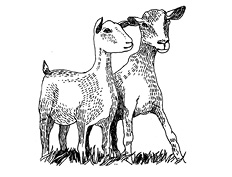 Pets: Brush clearing, and packing, and entertainment are the most common use for pets. They are voracious brush eaters. They will clear out poison ivy, wild raspberries, wild roses, and other thorny overgrown areas. Remember, they will also clean out your garden for you, so be careful! They are also great pack animals and can learn this fun sport quickly and easily. Let them carry your backpack for you on specially made frames and take them hiking.
Pets: Brush clearing, and packing, and entertainment are the most common use for pets. They are voracious brush eaters. They will clear out poison ivy, wild raspberries, wild roses, and other thorny overgrown areas. Remember, they will also clean out your garden for you, so be careful! They are also great pack animals and can learn this fun sport quickly and easily. Let them carry your backpack for you on specially made frames and take them hiking.
Next page
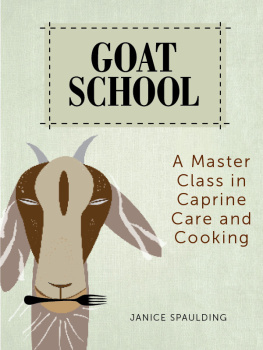
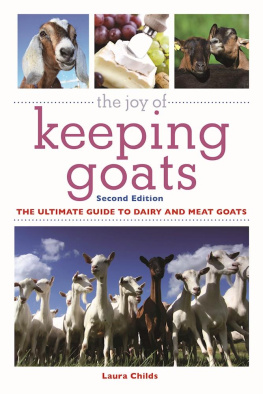
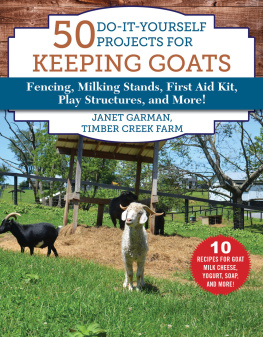
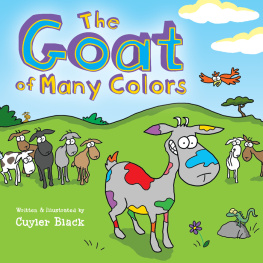


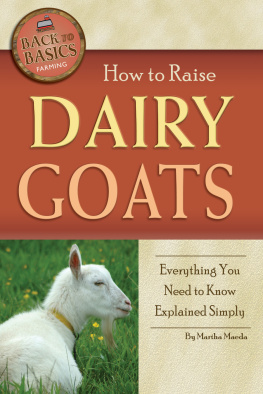
 Books Magazine Online www.downeast.com Distributed to the trade by National Book Network
Books Magazine Online www.downeast.com Distributed to the trade by National Book Network  To Martha, my sister and friend! Thank you for prodding, joking, and teasing me into doing this book in my spare time. Thank you for crying with me when I lost my dog, for laughing with me at the antics of our goats, and just for being there. You are a true best friend! Introduction We started our goat-raising adventure before the invention of the Internet and well before cell phones, back in the days of long-distance telephone charges and monthly periodicals with breeder lists. Imagine trying to do that today! Our first goats were located in Lebanon, New Hampshire. Two angoras gave us our start.
To Martha, my sister and friend! Thank you for prodding, joking, and teasing me into doing this book in my spare time. Thank you for crying with me when I lost my dog, for laughing with me at the antics of our goats, and just for being there. You are a true best friend! Introduction We started our goat-raising adventure before the invention of the Internet and well before cell phones, back in the days of long-distance telephone charges and monthly periodicals with breeder lists. Imagine trying to do that today! Our first goats were located in Lebanon, New Hampshire. Two angoras gave us our start. Why Raise Goats?
Why Raise Goats?  Getting the Goat Bug Goats are amazing creatures. They are smart, funny, personable, nosy, and did I say smart? They can open any latch, sometimes unlock doors, turn light switches on and off, take things apart, and they love to help! Yes, help. They will help you shovel snow or poop, they will help you put back together what they so nicely took apart, they will untie your shoe laces for you, they love helping take things out of your pockets, they love to help you change that light bulb when you are up on a ladder, but most of all they will help you fall in love with them. And, of course, there are all the good products that they produce (with a little help from you): fiber, meat, dairy, brush clearing, packing; they are also used in the medical research fields. Goats are used to obtain certain serums used in medications (no they do not kill them to do that).
Getting the Goat Bug Goats are amazing creatures. They are smart, funny, personable, nosy, and did I say smart? They can open any latch, sometimes unlock doors, turn light switches on and off, take things apart, and they love to help! Yes, help. They will help you shovel snow or poop, they will help you put back together what they so nicely took apart, they will untie your shoe laces for you, they love helping take things out of your pockets, they love to help you change that light bulb when you are up on a ladder, but most of all they will help you fall in love with them. And, of course, there are all the good products that they produce (with a little help from you): fiber, meat, dairy, brush clearing, packing; they are also used in the medical research fields. Goats are used to obtain certain serums used in medications (no they do not kill them to do that). Pets: Brush clearing, and packing, and entertainment are the most common use for pets. They are voracious brush eaters. They will clear out poison ivy, wild raspberries, wild roses, and other thorny overgrown areas. Remember, they will also clean out your garden for you, so be careful! They are also great pack animals and can learn this fun sport quickly and easily. Let them carry your backpack for you on specially made frames and take them hiking.
Pets: Brush clearing, and packing, and entertainment are the most common use for pets. They are voracious brush eaters. They will clear out poison ivy, wild raspberries, wild roses, and other thorny overgrown areas. Remember, they will also clean out your garden for you, so be careful! They are also great pack animals and can learn this fun sport quickly and easily. Let them carry your backpack for you on specially made frames and take them hiking.